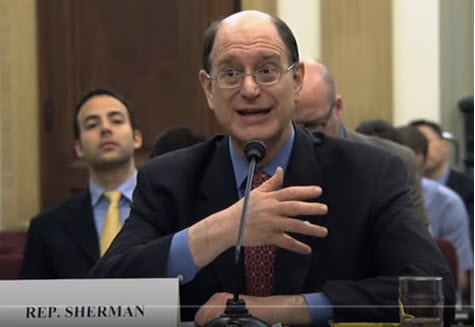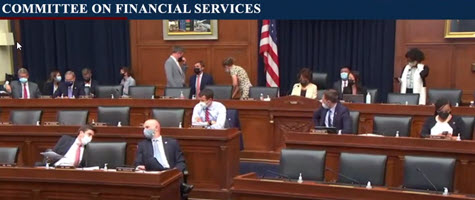Imminent Expiration of CDC Eviction Moratorium Prompts White House, FHFA Actions to Protect Tenants; Real Estate Groups Counter 11th Hour Attempts at Extension

The Biden Administration took steps this week to protect tenants at risk of eviction for non-payment of rent. (PoliticoPro, July 28). Announcements from the White House and the Federal Housing Finance Agency (FHFA) were prompted by the anticipated July 31 expiration of the national moratorium on residential tenant evictions – first enacted by Congress in March 2020, then extended by the Centers for Disease Control (CDC), and scheduled to sunset tomorrow. (Roundtable Weekly, June 25)
Congressional Action
- In response to the CDC moratorium’s expected lapse, Congressional Democrats today pursued an 11th hour attempt to resuscitate the eviction ban through legislation. The Hill reported late today that efforts to extend the federal moratorium "fell far short amid resistance from moderates and housing industry groups." House Speaker Nancy Pelosi (D-CA) subsequently urged the CDC to unilaterally extend the current moratorium again. Politico reported earlier today that House Democrats were considering extending the moratorium to mid-October – and that there was not a plan yet to get the vote through Senate Republicans.
- A coalition of 15 national real estate organizations – including The Real Estate Roundtable – sent a letter today to all members of Congress strongly opposing another moratorium extension. The joint letter called for policymakers to focus on disbursing the vast unspent sums of federal rental assistance appropriated in prior COVID-19 bills – instead of destabilizing rental markets with a new legislative eviction moratorium.
- Roundtable President and CEO Jeffrey DeBoer commented, “In the first half of this year, Congress rightly appropriated more than $45 billion for rental assistance, but so far states have distributed less than 10 percent of that assistance. If the moratorium is extended, it needs to be more tightly targeted to people in distress due to the pandemic, including housing providers.”
Federal Actions Supporting Tenants

- The FHFA announced on Wednesday that owners of all multifamily properties with a federally-backed mortgage must provide a 30-day written notice to a tenant before requiring removal for not paying rent.
- [Most states already have laws requiring some “wait period” or notice to tenants before eviction proceedings can commence, though typically not as long as 30 days according to this summary.]
- The FHFA’s notice requirement had been limited to situations where a landlord received mortgage forbearance protections. Now, the FHFA requires the tenants’ notice regardless of whether the landlord benefits from delayed loan payments – where the debt is backed by Fannie Mae, Freddie Mac, or a federal agency. (See FHFA fact sheet).
- The White House on June 24 released its fact sheet, “Initiatives to Promote Housing Stability by Supporting Vulnerable Tenants and Preventing Foreclosures.” The fact sheet also references “strict adherence” to tenant notice requirements and offers further measures such as:
- Accelerating disbursement of Emergency Rental Assistance (ERA) to get the funds appropriated by Congress into the hands of landlords and tenants;
- Providing a streamlined payment option so large landlords can receive “bundled” payments from multiple eligible tenants; and
- Urging state and local courts to participate in "eviction diversion efforts" that encourage landlords and tenants to access ERA funds before litigation is pursued.
- The White House released another fact sheet on Wednesday summarizing how private sector companies, non-profits, and government agencies are notifying Americans about available emergency rental assistance – including a national “rental assistance finder” produced by the Consumer Financial Protection Bureau (CFPB) that helps tenants apply for ERA funds in their localities.
Rental Assistance Delays

- Severe delays in getting federal rental aid to those in need have added another layer of pressure on tenants at risk of eviction – as well as on housing providers who are unable to collect rent, yet remain responsible for taxes, maintenance and other property costs. (Wall Street Journal, July 22)
- Only 6.5 percent of $46.5 billion allocated by Congress for rental aid has found its way to state and localities in the first half of 2021, according to a recent Treasury Department report. (Washington Post, July 21 and Bloomberg and July 22)
- Treasury’s report also notes some progress – more than $1.5 billion in rental assistance reached households in June, which is more than all of the money disbursed between January and May combined.
- The Roundtable is part of a broad real estate coalition that has consistently urged state, county and municipal officials to distribute the billions in allocated federal funds as soon as possible. (Coalition letter, April 15)
- The National Multifamily Housing Council (NMHC) on July 26 urged the leadership of the Senate Banking and House Financial Services Committees to push for the swift distribution of rental assistance funds.
- Additionally, a recent NMHC survey of apartment owners and managers shows that 100 percent of multifamily firms surveyed worked with residents facing financial hardships since the onset of the COVID-19 crisis.
Biden’s “Hands-Tied” by SCOTUS

- A U.S. Supreme Court majority indicated last month that the CDC overstepped its authority in issuing the federal-level eviction ban, with Justice Kavanaugh writing that “clear and specific” legislation from Congress would be necessary to extend the moratorium past July 31. (New York Times, June 30) The Biden Administration reportedly “found its hands to be tied” by the high Court’s decision. (PoliticoPro, July 29)
- The White House issued a July 29 statement, noting, “President Biden would have strongly supported a decision by the CDC to further extend this eviction moratorium to protect renters at this moment of heightened vulnerability. Unfortunately, the Supreme Court has made clear that this option is no longer available.”
- The statement also requested the U.S. Departments of Housing and Urban Development, Agriculture, and Veterans Affairs to extend their respective eviction moratoria through the end of September “to provide continued protection for households living in federally-insured, single-family properties.”
Yesterday’s statement from the administration sparked today’s last-minute scramble in Congress. White House Press Secretary Jen Pskai said, “In light of the Supreme Court’s ruling, the President calls on Congress to extend the eviction moratorium to protect such vulnerable renters and their families without delay.”
# # #









